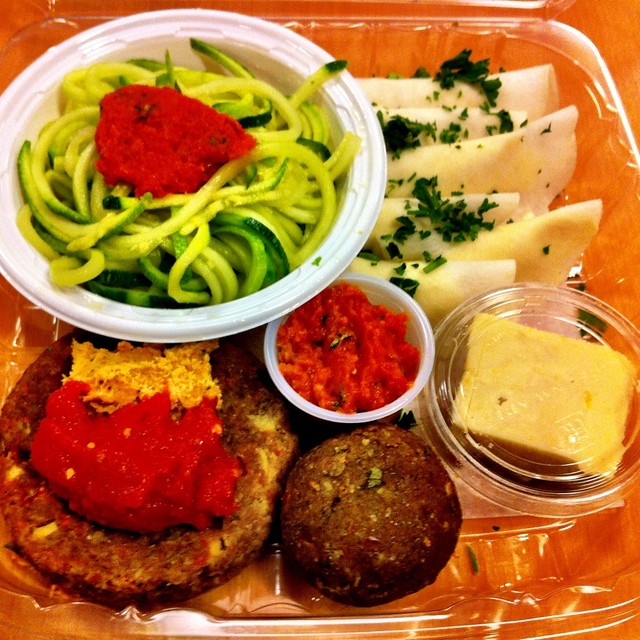No.

Ok, bye, see ya next week.
Just kidding! Thought I’d give you the quick answer in case you’re rushing out the door, art portfolio under arm and travel coffee cup in hand (that’s how I imagine you. I wish I was you. You sound cool).
Personally, I don’t really get the whole ‘raw’ deal.
If you don’t know, raw vegans eat (raw!) veg, fruit, nuts and nut butters, seeds, sea vegetables and sprouted legumes and grains. As it is edible raw, they may eat oatmeal.
They avoid steamed or boiled rice, quinoa (all cooked grains in fact) potatoes, sweet potatoes (any veg that HAS to be cooked to be palatable), cooked legumes, beans, bread, and of course any baked goods.
My first thoughts when pondering raw are – we have fire. Fire is natural and good. When used well it can make food taste better.
However, I don’t know enough about a raw diet to completely condemn it. I admit I’ve never eaten completely raw, so I’m certainly not going to rip it to shreds here.
What I am going to argue is that a varied whole food, plant-based diet is healthier than a 100% raw vegan diet might be.
Let’s not forget – most of us are already partially raw. We all eat fresh fruit, and it wouldn’t be summer without lots of delicious salads. I don’t know about you, but I always have some raw vegetation in my sandwiches every day. Did I just make that sound like I ate grass? I mean, it’s usually some romaine lettuce, tomato, spring onion, sometimes some sliced radish – yummy with hummous or peanut butter.
Raw food is most definitely PART of a healthy lifestyle, and there may be health situations where a larger amount of raw foods is advised.
I’ve happily eaten in raw restaurants, and this raw key lime pie is heaven on steroids.
But – it’s just not something we need to do all the time.
The raw crowd argue that we lose nutrients by heating up food. This may be true sometimes, and we do need to be wary of over-cooking veg for this reason, but we also gain nutrients when heating up food by making it more digestible and therefore the nutrients more absorbable. If we eat a wide array of grains, beans, legumes, veg, fruit, nuts and seeds; and if when we cook our food we mostly steam or boil (as in soups and stews) – as opposed to high heat methods like frying and barbecuing – we ingest as many nutrients as we need.
Of course it’s ok to fry or barbecue veg occasionally, just not on a regular basis.
Dr Joel Fuhrman points out that because raw fooders don’t eat whole grains or beans, it’s hard for them to meet daily caloric needs, and there is a tendency to fill up on nuts and seeds to feel fully satiated. Though these are excellent foods, their high fat content means they shouldn’t be eaten in too great a quantity or too often, as too much fat – even from plants – can be problematic health-wise.
The other factor is location. If you are lucky enough to live in sunnier climes – first of all, good for you, you win life! Second of all, eating more raw food is suited to your climate. You will no doubt have a higher percentage of raw foods in your diet like cooling tropical fruits such as mangoes, pineapple etc., and naturally gravitate more often towards salads and cold soups. But if you live somewhere with seasons, where it gets cold (me too, I commiserate!) then plenty of hot hearty soups, stews, veg curries and chilis full of beans and grains are a must to keep you warm, full, energetic and strong. Tropical fruit, salads or cold zucchini pasta are not gonna cut it – certainly not in a British or US east coast winter.
One thing that puts me off (as well as the fact that there’s no health benefit above and beyond a vegan diet) is that raw can be faffy, and there can be a certain amount of gadgetry involved. All that dehydrating, soaking, noodling and muslin doesn’t appeal a huge load. I know lots of us have blenders and blitzers, but I’m not a fan of any lifestyle that needs too much paraphernalia.
Also – and I warn you this isn’t remotely scientific, I’m just theorising; it’s perfectly natural to grab an apple from a tree and tuck in, or pull a lettuce from the ground, chop it up and eat it. You can tell by the texture of these foods that they’re meant to be eaten raw (you can cook them too of course, but they’re best raw). You don’t need to prep them, you can just start munching. But green cabbage? Brussels sprouts? Beetroot? Sweet potato? Don’t they need the great things fire can do for them? And chestnuts? Plantain? Squash? So many foods would not be edible raw. Doesn’t this mean that we are not meant to be 100% raw?
One thing you can say about a raw vegan diet is that it’s vastly healthier than a standard US/UK diet rich in animal and processed foods.
A varied whole food, plant-based (vegan) diet, with lots of cooked bean/legume/grain/sweet potato/potato based meals, is the best thing you can do for your health. Fruit is always great as a dessert, and salads are fabulous in appropriate weather. Eat more raw when it feels natural to do so if you’re in the sun, but otherwise – stay close pals with your hob, steamer and oven!
